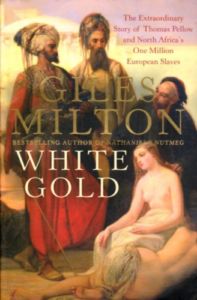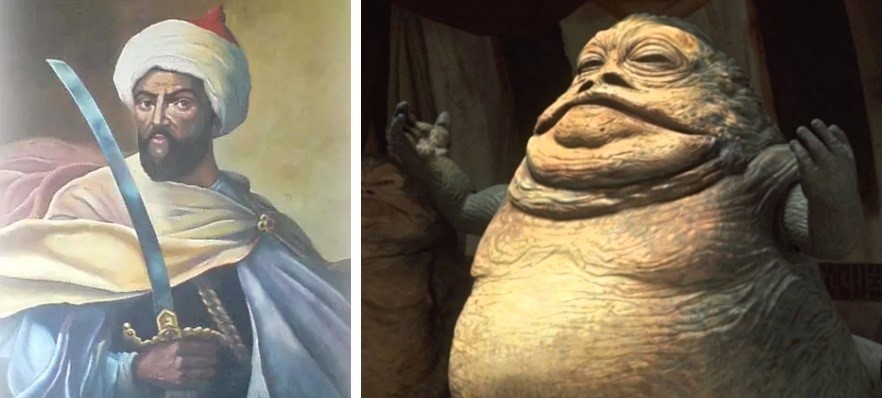23 Years a Slave: Giles Milton’s White Gold
Posted By Spencer J. Quinn On In North American New Right | Comments DisabledSince the abolition of slavery in the West over 150 years ago, the Left has weaponized it against white people for the purpose of gaining power. Along with the Jewish Holocaust, slavery of blacks in the New World has become nothing less than a blood libel which whites must suffer if they want to thrive in the very civilization their ancestors created. That Leftists don’t care about slavery per se should become obvious when noting four things they’d rather ignore:
- Whites and only whites were the ones who abolished slavery.
- Non-whites own millions slaves today, especially in Africa.
- Whites have endured slavery as indentured servants and as zeks in Soviet gulags.
- Non-whites are historically just as guilty of owning slaves as whites, if not more so.
Giles Milton brilliantly explores this “if not more so” clause in White Gold, his sparkling history of slavery in eighteenth-century Morocco.
Unlike many histories of Muslim-on-Christian slavery, White Gold focuses mostly on one person: Thomas Pellow, who spent 23 years as a slave to the Sultan of Morocco. His experiences were so horrendous, albeit suspenseful — with one close shave after another — that White Gold resembles a page-turning novel more than a book of history.
As a bright but restless 11-year-old from Cornwall, Thomas grew bored with school. In 1715 he begged his parents and his ship captain uncle John to take him onboard the Francis, a trading vessel bound for Genoa. The Sultan of Morocco, Moulay Ismail, had recently signed a treaty with the British, so fears of being abducted by Barbary corsairs along the way were minimal. What John Pellow didn’t know, however, was that the capricious and cruel Sultan had recently torn up this treaty, making British vessels fair game once again.
Sadly, Thomas’ parents and uncle consented to his pleas, and on his return voyage the crews of the Francis and two other British vessels were captured by fearsome Muslims pirates. After several grueling months at sea, they arrived at the West African port city of Salé, where they were placed in the presence of Moulay Ismail himself. The resplendent Sultan arrived in a chariot pulled by his numerous wives and eunuchs and inspected his purloined cargo with approval. We get an early taste of the Sultan’s character when, mere moments after congratulating the pirate captain for his haul of white slaves, he drew his sword and beheaded one of his admirals for not sufficiently resisting the British Navy.
After witnessing this horror, it’s hard to imagine the dread the white slaves must have felt when they were marched 100 miles inland to the Moroccan capital of Meknes. There, they were kept in underground prisons called matamores and forced to work 15-hour days, every day, constructing the Sultan’s vast palace and other works. Any captured female would, of course, be forced into the Sultan’s harem. Milton relies much on records left by Pellow and other Christian slaves, and so White Gold offers heartrending accounts of the constant abuse and torture white captives endured as slaves in Barbary:
Many slaves left accounts of these horrendous places, but only one — written by Germain Mouette — charts the full horror of life in his subterranean hell. The largest of Sale’s subterranean dungeons, which was often used for the most recently arrived captives, was supported by black pillars. It was so deep in the earth that water and sewage frequently bubbled up from the mud floor in the wet winter months. ‘In this, the Christians for the most part cannot lye on the ground as they do in the others,’ wrote Mouette, ‘because there is water in it knee deep, six months of the year.’
Milton also reveals so much about Moulay Ismail, before whom all had to quite literally grovel, that White Gold is as much about him as Pellow. The Sultan’s power was absolute. At his disposal were thousands of heavily-armed black African guards who delighted in torturing white slaves. He commanded not only a large fleet of corsairs, but also a land army over 100,000 strong across his sizeable North African empire. Further, he was a pious Muslim who practiced daily prayers and observed Ramadan.
Moulay Ismail’s vanity knew no bounds as he and his retinue lived in unparalleled comfort and opulence while the majority of his subjects — to say nothing of his slaves — lived in abject destitution. His bed could comfortably fit himself and 20 concubines. He sired over a thousand children, some of whom he murdered himself. In his old age he was followed by slaves who not only twirled parasols above him to keep sunlight and flies off his noble head, but also carried special cloths with which to catch the noble dribble oozing from his noble lips. Failing in these or similar tasks usually meant instant execution.
Milton recounts how Moulay Ismail justified such barbarism:
One European visitor to Moulay Ismail’s court even had the nerve to tell the sultan that if he wished to imitate the king of France, he should not have his subjects and slaves killed in his presence. ‘This is true,’ was the sultan’s ready answer, ‘but King Louis commands men, whereas I command beasts.’
While Moulay Ismail was quick to anger and even quicker to murder (his wearing yellow usually meant he was in a killing mood), he was also known for his iron discipline, as well as moments of mercy and clear-thinking. As his nation’s principal architect and engineer, he personally supervised and enforced all the work being done in Meknes. He had his hand in almost everything going on his purview, and was considered by most to be a capable, if utterly ruthless, sovereign. He ruled for 54 years, which was highly unusual in eighteenth-century North Africa, where intrigues, bloody rebellions, and tribal warfare were the norm.
In one episode, a teenaged Pellow was charged with guarding the Sultan’s harem and was ordered not to allow anyone through a particular door after a certain hour. Late one evening, when the Sultan himself got past the outer guards and was banging on the door, Pellow would not let him in. The furious Sultan stormed off, and Pellow thought for sure he’d lose his head by morning. The next day, however, Moulay Ismail magnanimously congratulated Pellow for doing his job and summarily executed all the guards who had let him pass. One of his favorite forms of execution, along with decapitation, was called “tossing” in which his muscular black guards threw the condemned victim in the air by his thighs and then vigorously twisted him on his way down, breaking his neck. He was known to hold court with foreign dignitaries with the blood of such victims still soaking his clothes.
 [2]
[2]You can buy Spencer J. Quinn’s Solzhenitsyn and the Right here [3].
Another pressure placed on Christian slaves was conversion, or “turning Moor,” as it was known in Europe. Most slaves resisted at first, but few could resist constant overwork, malnourishment, and torture (which included bastinadoing and burning). Pellow was no exception, although he did hold out for a relatively long time. The first reward for the apostate was a public and highly dangerous circumcision, after which his lot improved only slightly. Many Christian renegades graduated from unremitting toil to conscription into the Sultan’s armies, which suppressed rebellions everywhere in his empire.
Due to the overall lack of talent among his own people, Christian renegades often played crucial roles in the Sultan’s military, such as engineers, physicians, weapons-makers, and officers. Pellow in particular benefitted greatly due to his intelligence, leadership ability, and uncanny knack for not getting killed whenever he was dead to rights. Because he was often promoted, he enjoyed more privileges than did the majority of Christian slaves.
Another risk renegades took by turning Moor was to relinquish all hope of being ransomed by ambassadors from their home countries, although this hope was extremely slender to begin with. Milton recounts how many such men appeared at Moulay Ismail’s court only to leave empty-handed or with a token number of broken wretches in tow. Indeed, White Gold includes many appalling scenes in which complacent European leaders offered this despicable tyrant extravagant gifts to secure the release of countrymen in bondage, effectively rewarding abduction and piracy because it would be less costly than warfare.
One scene which will no doubt endear Thomas Pellow to today’s dissident Right occurred when Moulay Ismail, on a whim, decided to marry off hundreds of his captives at once. To his horror, Pellow was ordered to select a bride from among eight Negro women. After entreating the great Sultan with impeccable obeisance to allow him to marry a woman of his own color, the Sultan gave him a number of half-caste women from whom to choose. Again, the stubborn Pellow refused and took his life into his own hands to beseech the Sultan again for a fair-skinned bride. Amused, Moulay Ismail then presented his slave with a veiled woman and ordered him to marry her. Seeing that her hands and feet were nearly black as pitch, Pellow at first despaired. Upon unveiling her, however, he realized that she was indeed quite fair-skinned. Her extremities had been stained with henna — apparently the Sultan’s idea of a joke.
Pellow himself may have gotten lucky, but the practice of forcing interracial unions among slaves was not unusual of the many reigns throughout Barbary:
Such bizarre breeding programmes were by no means unique to Morocco. Mixed-blood slaves were also reared in Algiers, in order to increase the stock of half-caste servants of the regime. The French captive, Chastelet des Boyes, was bought by a slave master who kept fifteen or sixteen black women on his farm close to Algiers. He would regularly send his white slaves to breed with them and on one occasion selected Chastelet des Boyes. The Frenchman was taken to the farm by a eunuch, who ordered four of the women to strip him and set to work.
Milton may call such proverbial sex farms bizarre, but they make perfect sense from the standpoint of realpolitik. What better way to ensure the loyalty of one’s subjects than by drumming out competing racial loyalties through miscegenation?[1] [4]
Thomas Pellow ultimately outlived Moulay Ismail and returned home in his early thirties, not entirely broken by his trying tenure as a Barbary slave. This shouldn’t spoil the story, since the “it’s the journey, not the destination” trope applies to White Gold. Thomas Pellow’s story involves daring escapes, near-death experiences, hair-raising adventures, and a period in which Pellow nearly died of thirst after being led through the desert by a blind man.
Milton ends the story on a triumphant and ironic note: “In what was to prove a most extraordinary deus ex machina in the story of white slavery, the Pellow family of Cornwall was about to take its terrible revenge.”
Milton is referring to Sir Edward Pellew, a descendent of Thomas Pellow’s extended family from Cornwall who, exactly one century after Thomas’ abduction, led a large British fleet to Algiers and quite rightly destroyed it. Following the recent example set by the Americans in Tripoli — as well as the less-recent banning of the transatlantic slave trade — the British had finally had enough of appeasing the barbaric Muslim slave-drivers of Barbary. They resolved to end white slavery and the maritime trade in white slaves once and for all.
Taking Algiers was not easy, yet Pellew was up to the task:
They were wreaking havoc on Pellew’s fleet, shattering timbers with their heavy shot and disabling rigging and sails. ‘Legs, arms, blood, brains and mangled bodies were strewn about in all directions,’ wrote Lieutenant John Whinyates. ‘You could scarcely keep your feet from the slipperiness of the decks, wet with blood.’ Yet Pellew refused to withdraw to safety, for he believed it was his sacred duty to fight to the death. ‘The battle was fairly at issue between a handful of Britons in the noble cause of Christianity,’ he wrote, ‘and a horde of fanatics.’
After a day of constant shelling, Algiers finally capitulated. The 1,642 white slaves in captivity there were immediately set free. Shortly afterwards, Tunis, Tripoli, and Morocco manumitted their slaves as well. All this happened because of one battle — a battle which took the lives of thousands of Muslims and cost the British a mere 141 sailors.
This bears repeating. Sacrificing 141 white lives was all it took to end the nefarious and widespread practice of kidnapping and enslavement which, from 1500 to 1800, destroyed the lives of over a million white Christians. Giles Milton certainly ends his riveting history on a triumphant note, but for me, the ending was more perplexing than anything else. So much of this suffering could have been prevented had the European powers simply eschewed appeasement and stood up to the Barbary villains in the first place. Instead, time and time again they kept their eyes on their bottom line and chose the path of least resistance. Where is the triumph in that?
The same thing is happening today as Europe becomes more and more Islamicized. European leaders concern themselves with economic prosperity and kowtowing to the woke Leftist agenda rather than the current Muslim invasion that is slowly stripping the indigenous peoples of Europe of their civil liberties. With increased crime and terror, networks of grooming gangs, and the fact that Muslims from the Middle East and North Africa are colonizing European cities, it won’t be terribly long before white Europeans become minorities in their own homelands. When that happens, there is no reason not to expect the same treatment from these people that white Christian sailors suffered centuries ago.
Whether a descendent of Thomas Pellow will come out of the woodwork and save them once again, only time will tell.
* * *
Counter-Currents has extended special privileges to those who donate $120 or more per year.
- First, donor comments will appear immediately instead of waiting in a moderation queue. (People who abuse this privilege will lose it.)
- Second, donors will have immediate access to all Counter-Currents posts. Non-donors will find that one post a day, five posts a week will be behind a “Paywall” and will be available to the general public after 30 days.
- Third, Paywall members have the ability to edit their comments.
- Fourth, Paywall members can “commission” a yearly article from Counter-Currents. Just send a question that you’d like to have discussed to [email protected] [5]. (Obviously, the topics must be suitable to Counter-Currents and its broader project, as well as the interests and expertise of our writers.)
To get full access to all content behind the paywall, sign up here:
Paywall Gift Subscriptions
 [6]If you are already behind the paywall and want to share the benefits, Counter-Currents also offers paywall gift subscriptions. We need just five things from you:
[6]If you are already behind the paywall and want to share the benefits, Counter-Currents also offers paywall gift subscriptions. We need just five things from you:
- your payment
- the recipient’s name
- the recipient’s email address
- your name
- your email address
To register, just fill out this form and we will walk you through the payment and registration process. There are a number of different payment options.
Note
[1] [7] As an aside, Moulay Ismail’s utter loathsomeness, coupled with his autocratic narcissism, causal brutality, over-the-top lavishness, and his court’s exotic nature reminded me of someone — or something, really.
Yes, Jabba the Hutt. Moulay Ismail is Jabba the Hutt. I wonder if George Lucas or one of his set designers called on long-suppressed folk memories of Moulay Ismail when putting together Return of the Jedi. Stranger things have happened, for sure.

